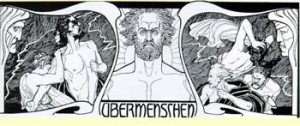In an earlier post, I suggested that the Glaucon’s initial inquiry into the nature of justice in Plato’s Republic II is chiefly a response to sophistic arguments involving the relationship of “law” to “justice”. This is significant for our own investigation into the authenticity of the text called On Law and Justice and ascribed to the Pythagorean philosopher Archytas of Tarentum. There is further evidence worth considering that suggests the influence of this debate among the sophists of the late 5th and early 4th Centuries BCE. A sophistic text preserved by Iamblichus in his Protrepticus, whose title is unknown, and which features an author often referred to in the scholarly literature as “Anonymous Iamblichi”, has never, to my knowledge, been brought to bear on the study of the On Law and Justice attributed to Archytas[1], and it provides us with a very useful point of comparison for the composition of our text.
Anonymous Iamblichi’s text has generally been regarded as written by a follower of Protagoras in the generation following him, although some have gone so far as to argue that it is a genuine text by Protagoras. Regardless of whether this text was penned by Protagoras or by one of his followers – a question that is likely never to be answered – it should be considered a sophistic text of the type described by Glaucon in Republic II, on the origins and essence of justice, and part of the intellectual milieu of the first two decades of the 4th Century BCE.
A short summary of the arguments made by Anonymous Iamblichi, with examination of precisely how “law and justice” (ὁ τε νόμος καὶ τὸ δίκαιον) recur as a topos within the text, reveals the debt that the Archytan On Law and Justice owes to the larger genre of sophistic epideictic show pieces on the nature and origins of justice. In Anonymous Iamblichi’s text, the argument leads up to a discussion of “law and justice” by way of a demonstrably Protagorean claim: there is great value in the apprehension of the arts of speaking (τέχνην τὴν κατὰ λόγους πυθόμενος).[2] The author argues that good repute can be attained over time through learning the arts of speaking and, importantly, of avoiding bad arguments and habits.[3] Once one has attained certain skills to a level of full mastery, he is expected to employ those goods for “good and lawful purposes” (εἰς ἀγαθὰ καὶ νόμιμα καταχρῆσθαι δεῖ), rather than to abuse them for “unjust and unlawful” (ἄδικά τε καὶ ἄνομα) ends.[4] This argument should be seen as a challenge to the Calliclean argument in Plato’s Gorgias (483a8-e4) that boils down to “might is right”. Anonymous Iamblichi provides a very interesting counterargument to the Calliclean position in what I am calling the “Superman”argument:
If there should be anyone born with such a nature as the following – invulnerable, not subject to disease, free from emotions, of supernatural power, with body and soul of adamant (ἄτρωτος τὸν χρῶτα ἄνοσός τε καὶ ἀπαθὴς καὶ ὑπερφυὴς καὶ ἀδαμάντινος τό τε σῶμα καὶ τὴν ψυχήν) – perhaps one might suppose that power based on self-aggrandizement (τὸ ἐπὶ τῇ πλεονεξίᾳ κράτος) would serve for such a one (for such a one, one might argue, would be unscathed even if he did not submit to the law); but one would not be correct in such a supposition. For even if one admitted the possibility of such a man, as in fact there cannot be, he would only survive if he allied himself with the laws and with justice (τοῖς νόμοις συμμαχῶν καὶ τῷ δικαίῳ), supporting (ἐπικουροῦντα) these and lending his strength to backing up these and what conduces to them. Only thus would he ensure his safety; otherwise he could not survive. For I think that all men would stand opposed to a person of such a nature because of their own lawfulness (εὐνομία), and in virtue of their numbers they would overcome such a man by craft or by force and get the better of him. Accordingly, it becomes apparent that power – true power, that is – is preserved by law and through justice (τὸ κράτος…διά τε τοῦ νόμου καὶ διὰ τὴν δίκην).
(Anonymous Iamblichi, from Iamblichus, Protrepticus pp. 100.18-101.6 Pistelli; translated after Dillon and Gergel)

The “superman” is employed as a counterargument to the Calliclean claim that the strength based on self-aggrandizement (pleonexia) makes possible the “superman’s” safety when he declares war on “law and justice”. Naturally, the Persian King Xerxes is a perfect example for Callicles to cite as something approximating a “superman”. But even if, Anonymous Iamblichi argues, such a “superman” were to exist and to declare war on “law and justice”, he would nevertheless be overcome by the superiority of numbers and technology of those other humans who naturally have proclivity to the law. Anonymous Iamblichi would not dispute Callicles’ claim that nature and law are strongly related, but he would dispute the contingency that natural law accords with the principle of “might means right”.
I guess it’s a good thing (for his own sake) that our superman is a law-abiding citizen and standard-bearer of the Justice League. Anonymous Iamblichi would approve.

[1] Carl Huffman’s otherwise excellent ‘Archytas and the Sophists’ (in Caston and Graham (eds.), Presocratic Philosophy: Essays in Honour of Alexander Mourelatos, Ashgate: 2002, pp. 251-70) discusses F3 of Archytas in the light of Anonymous Iamblichi, but not the Archytan fragments of On Law and Justice.
[2] Iambl. Protr. p. 96.26-7 Pistelli.
[3] Iambl. Protr. pp. 96.28-97.4 Pistelli.
[4] Iambl. Protr. p. 97.16-22 Pistelli.
